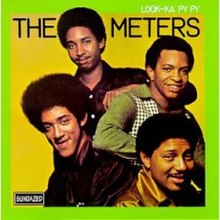Look-Ka Py Py
| Look-Ka Py Py | ||||
|---|---|---|---|---|
 | ||||
| Studio album by | ||||
| Released | December 1969 | |||
| Recorded | LeFevre Sound Studios,[1] Atlanta, Georgia | |||
| Genre | Funk | |||
| Length | 36:27 | |||
| Label | Josie (JOS-4011) | |||
| Producer | Allen Toussaint, Marshall Sehorn | |||
| The Meters chronology | ||||
| ||||
| Review scores | |
|---|---|
| Source | Rating |
| Allmusic | |
| Rolling Stone | |
Look-Ka Py Py is the second studio album by the American funk group The Meters. The instrumental album was ranked number 218 on the Rolling Stone list of 500 Greatest Albums of All Time in 2003,[4] and 220 in a 2012 revised list.[5]
Reception
Cub Koda of AllMusic said of the album and the band: "The second album by The Meters continues the sound that made them New Orleans legends."[2] Ted Drozdowski of Rolling Stone characterized the album's sound as "clear, unhurried and certain". He characterized the guitar sound as "brief, precise", the organ sound as "free of the rhythm", the bass sound as "fat, saw-tooth grooves", and the drum sound as "dry and up front".[3] In ranking the album for its greatest-all-time list, the magazine noted the bass riffs and the off-beat drumming.[4]
The album's title track "Look-Ka Py Py" reached #11 on the US R&B Singles chart and the album reached #23 on the US R&B Albums chart.[6]
Style
In his 2008 book, Tom Moon wrote: "the key characteristic is restraint. Nobody works too hard on Meters records. The rhythm is built on a loose-tight axis, with some elements (usually Zigaboo Modeliste's snappish drumming) pushing forward and other forces (the carefully articulated guitar lines of Leo Nocentelli or spare jabs from Art Neville's B3 organ) pulling back."[7]
Track listing
All tracks are written by Art Neville, Ziggy Modeliste, Leo Nocentelli and George Porter, Jr., except as noted
| No. | Title | Writer(s) | Length |
|---|---|---|---|
| 1. | "Look-Ka Py Py" | 3:20 | |
| 2. | "Rigor Mortis" | 2:38 | |
| 3. | "Pungee" | 3:01 | |
| 4. | "Thinking" | 1:45 | |
| 5. | "This Is My Last Affair" | 2:55 | |
| 6. | "Funky Miracle" | 2:28 | |
| 7. | "Yeah, You're Right" | 2:46 | |
| 8. | "Little Old Money Maker" | 2:42 | |
| 9. | "Oh, Calcutta!" | Stanley Walden | 2:45 |
| 10. | "The Mob" | 2:49 | |
| 11. | "9 'Til 5" | 2:51 | |
| 12. | "Dry Spell" | 2:33 |
| No. | Title | Length |
|---|---|---|
| 13. | "Grass" | 2:42 |
| 14. | "Borro" | 2:12 |
Personnel
Credits adapted from AllMusic.[8]
- Ziggy Modeliste – drums
- Art Neville – organ
- Leo Nocentelli – electric guitar
- George Porter, Jr. – bass guitar
Production
- Allen Toussaint – producer
- Marshall Sehorn – audio production
- Tim Livingston – project manager
- Rodney Mills – audio engineer
- Al Quaglieri – mastering
- Bob Irwin – mastering
- Rich Russell – package design
- Bill Dahl – liner notes
References
- ^ "The Meters – Look-Ka Py Py". Discogs.com. Archived from the original on November 8, 2017. Retrieved November 7, 2017.
- ^ a b "Allmusic: Look-Ka Py Py – review". allmusic.com. Archived from the original on December 22, 2015. Retrieved October 3, 2011.
- ^ a b Ted Drozdowski (November 1, 1990). "The Meters: Look-Ka Py Py". Rolling Stone (RS 590). Straight Arrow. ISSN 0035-791X. Archived from the original on November 18, 2007.
- ^ a b "The 500 Greatest Albums of All Time". Rolling Stone (Special Issue). Straight Arrow. 218 | Look-Ka Py Py - The Meters. November 2003. ISSN 0035-791X. Archived from the original on December 20, 2010. Retrieved October 3, 2011.
- ^ "500 Greatest Albums of All Time". Rolling Stone. 2012. Retrieved September 16, 2019.
- ^ Thompson, Dave (2001). Funk, Third Ear: The Essential Listening Companion. Hal Leonard. pp. 167–168. ISBN 9780879306298. Retrieved November 7, 2017.
- ^ Tom Moon (2008). 1,000 Recordings to Hear Before You Die. Workman Publishing. pp. 500. ISBN 9780761139638. Retrieved November 7, 2017.
- ^ "Allmusic: Look-Ka Py Py – credits". allmusic.com. Archived from the original on December 22, 2015. Retrieved December 20, 2015.
